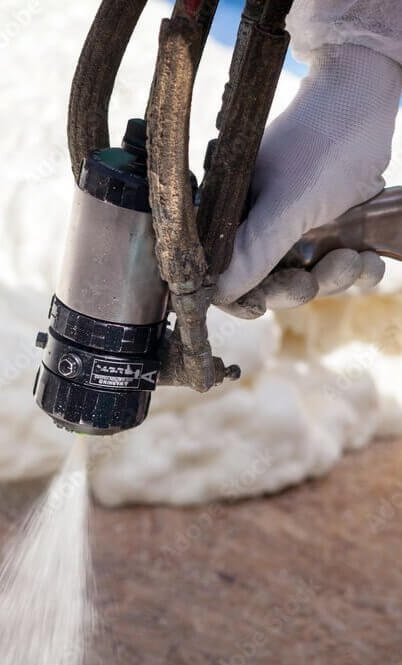WHAT TO KNOW BEFORE STARTING A SPRAY FOAM INSULATION BUSINESS
Get the Advice, Insight & Tips You Need From the Experts at IDI
Spray foam insulation is a favorite amongst architects and building owners for a variety of reasons. Closed-cell spray foam offers higher R-value, moisture resistance and racking strength, while open-cell offers a great price point, sound dampening and an ideal solution for applications like the tops of attics in southern regions of the USA.
Spray foam insulation operations can range from huge companies that span multiple states to single-person companies that only work in their local region. Finding the right niche is important, but spray foam insulation is still a growing industry and has space for businesses of all sizes. If you’re interested in learning how to start a spray foam insulation business or don’t know how to spray foam, it is really important to attend one of IDI’s spray foam trainings or reach out to us here. We have foam techs, IDI partners, and the top suppliers of the spray foam insulation industry.
Table of Contents

Understanding Spray Foam Insulation
In short, spray foam insulation is made of isocyanate and polyol that are combined when they are sprayed and the chemical reaction between the two creates a layer of insulation. Spray foam insulation has an overall higher R-value than other insulation options, lasts longer, is better at reducing noise and allergens, and prevents mold and mildew growth.
Open Cell vs. Closed Cell
Spray foam is available in open cell or closed cell varieties. Open cell is suited for noise reduction and creates an impermeable barrier for air. To fully protect from moisture, a vapor barrier is often used. Closed cell spray foam is denser, making it perfect for keeping out air and, in thick enough applications, acting as a class two vapor retarder, while also contributing to improving the structural integrity of the building.
Preparing to Launch Your Spray Foam Business
Developing a deep understanding of spray foam insulation is a must — you’ll need to know how to talk about it inside and out — but starting a successful insulation business requires more than just knowledge of your product. Creating a solid plan and doing your research beforehand is vital to setting yourself up to hit the ground running.
Attending an IDI training can be one of the most helpful steps you can take as you’re starting your research and planning phase. Take advantage of expert instruction on application techniques, breakdowns of the latest market trends, sales tips, information about new products and more. Trainings are available online or in person to make it as convenient as possible for you to attend.

Legal and Regulatory Considerations
Being on the wrong side of legal requirements or regulations can wrap up your business in miles of red tape or force you to shut your doors before you even get a chance to succeed. Attend our IDI Trainings to learn about what you can do to keep your team and business safe.

Health and Safety Compliance
From OSHA to your local regulations, it’s important to remain compliant to all standards concerning the health and safety of you, your team (if you have one) and the people that will occupy the building you insulate. To make sure you’re using the safest, latest spraying techniques and equipment, attend an IDI training. We offer a number of multi-day training courses all over the country, as well as online options. Find a training happening near you!
Licensing Requirements
Research the requirements for licensure and certification your state requires to operate both as a spray foam insulation business and installer. In some states, you only need to have a business license, while others have more stringent requirements. Reach out to our IDI experts to know what type of licensing requirements you will need for your state.
Essential Spray Foam Equipment and Materials
Deciding on the best equipment for your business can be daunting. There are many options and opinions to sort through before you even consider the price. Luckily, IDI has some tips to help you pick the right gear for your business.
Supply Chain Management
Two of the most important things you can do as you start your spray foam business are to develop a strong relationship with your supplier and ensure your inventory is always up-to-date for future and immediate needs. If you can find a supplier that can handle your equipment, spray foam insulation, accessories and keeps you up to date with all the latest in spray foam insulation news and best practices, you’ll be in good hands.
Choosing the Right Equipment
When you are deciding on which spray foam rig to buy, consider the largest project you will be taking on and buy a machine that can handle jobs of that size. A too-small machine is more prone to breaking down and loses you money on labor.
Another major consideration to make is the climate that you are spraying in. Cold climates will require a heater to keep the chemicals at the correct temperature — generally speaking, the larger the machine, the larger the heater.

Financial Management for Sustainable Growth
From financing your business to forecasting future profits, there is much to consider on the path towards healthy sustainable growth. That growth is not linear and it isn’t always predictable, but there are a few steps you can take in order to achieve your business goals and succeed far into the future.
Gathering Funds for Your Spray Foam Business
Finding funding to start your new spray foam business can look very different for different people. If you have an influx of cash from another venture or have been pinching pennies, dropping tens of thousands of dollars — or more — on equipment, start-up costs, marketing and space could be an option. For many people, however, financing of some kind is needed. Whether lending from your local bank or directly from IDI, there are a number of ways you can finance your business responsibly.
Pricing Strategies
Finding out what other spray foam insulation businesses in your region charge is one of the most important pieces of research you can do when starting out. Price your services competitively — too high and potential customers will go elsewhere, too low and people will wonder what corners are getting cut.
Managing Finances
Create a budget for your business and stick to it. In addition to keeping spending down, a budget and proper accounting can help you forecast the costs of your material and labor needs in the future. No matter if you manage your business finances yourself or hire professionals like a financial advisor or accountant, staying on top of the financial situation is important for a healthy business.
